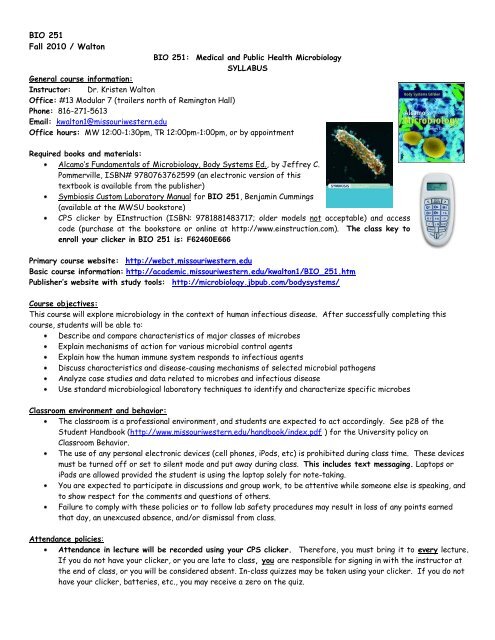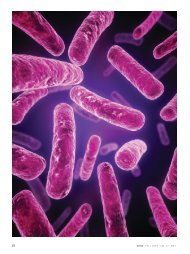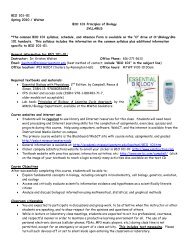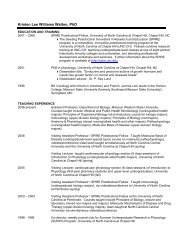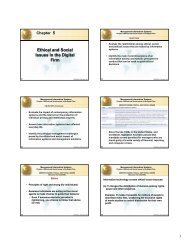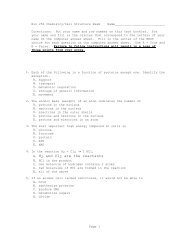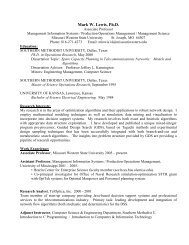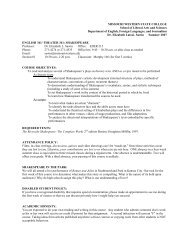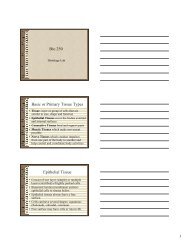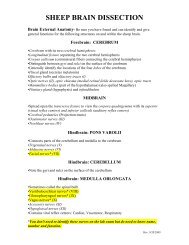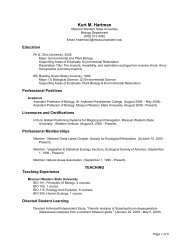Course syllabus and schedule - Academic Resources at Missouri ...
Course syllabus and schedule - Academic Resources at Missouri ...
Course syllabus and schedule - Academic Resources at Missouri ...
You also want an ePaper? Increase the reach of your titles
YUMPU automatically turns print PDFs into web optimized ePapers that Google loves.
BIO 251<br />
Fall 2010 / Walton<br />
BIO 251: Medical <strong>and</strong> Public Health Microbiology<br />
SYLLABUS<br />
General course inform<strong>at</strong>ion:<br />
Instructor: Dr. Kristen Walton<br />
Office: #13 Modular 7 (trailers north of Remington Hall)<br />
Phone: 816-271-5613<br />
Email: kwalton1@missouriwestern.edu<br />
Office hours: MW 12:00-1:30pm, TR 12:00pm-1:00pm, or by appointment<br />
Required books <strong>and</strong> m<strong>at</strong>erials:<br />
Alcamo’s Fundamentals of Microbiology, Body Systems Ed., by Jeffrey C.<br />
Pommerville, ISBN# 9780763762599 (an electronic version of this<br />
textbook is available from the publisher)<br />
Symbiosis Custom Labor<strong>at</strong>ory Manual for BIO 251, Benjamin Cummings<br />
(available <strong>at</strong> the MWSU bookstore)<br />
CPS clicker by EInstruction (ISBN: 9781881483717; older models not acceptable) <strong>and</strong> access<br />
code (purchase <strong>at</strong> the bookstore or online <strong>at</strong> http://www.einstruction.com). The class key to<br />
enroll your clicker in BIO 251 is: F62460E666<br />
Primary course website: http://webct.missouriwestern.edu<br />
Basic course inform<strong>at</strong>ion: http://academic.missouriwestern.edu/kwalton1/BIO_251.htm<br />
Publisher’s website with study tools: http://microbiology.jbpub.com/bodysystems/<br />
<strong>Course</strong> objectives:<br />
This course will explore microbiology in the context of human infectious disease. After successfully completing this<br />
course, students will be able to:<br />
Describe <strong>and</strong> compare characteristics of major classes of microbes<br />
Explain mechanisms of action for various microbial control agents<br />
Explain how the human immune system responds to infectious agents<br />
Discuss characteristics <strong>and</strong> disease-causing mechanisms of selected microbial p<strong>at</strong>hogens<br />
Analyze case studies <strong>and</strong> d<strong>at</strong>a rel<strong>at</strong>ed to microbes <strong>and</strong> infectious disease<br />
Use st<strong>and</strong>ard microbiological labor<strong>at</strong>ory techniques to identify <strong>and</strong> characterize specific microbes<br />
Classroom environment <strong>and</strong> behavior:<br />
The classroom is a professional environment, <strong>and</strong> students are expected to act accordingly. See p28 of the<br />
Student H<strong>and</strong>book (http://www.missouriwestern.edu/h<strong>and</strong>book/index.pdf ) for the University policy on<br />
Classroom Behavior.<br />
The use of any personal electronic devices (cell phones, iPods, etc) is prohibited during class time. These devices<br />
must be turned off or set to silent mode <strong>and</strong> put away during class. This includes text messaging. Laptops or<br />
iPads are allowed provided the student is using the laptop solely for note-taking.<br />
You are expected to particip<strong>at</strong>e in discussions <strong>and</strong> group work, to be <strong>at</strong>tentive while someone else is speaking, <strong>and</strong><br />
to show respect for the comments <strong>and</strong> questions of others.<br />
Failure to comply with these policies or to follow lab safety procedures may result in loss of any points earned<br />
th<strong>at</strong> day, an unexcused absence, <strong>and</strong>/or dismissal from class.<br />
Attendance policies:<br />
Attendance in lecture will be recorded using your CPS clicker. Therefore, you must bring it to every lecture.<br />
If you do not have your clicker, or you are l<strong>at</strong>e to class, you are responsible for signing in with the instructor <strong>at</strong><br />
the end of class, or you will be considered absent. In-class quizzes may be taken using your clicker. If you do not<br />
have your clicker, b<strong>at</strong>teries, etc., you may receive a zero on the quiz.
BIO 251 2<br />
In order to improve student learning as well as to achieve compliance with federal financial aid policies, Western<br />
has a m<strong>and</strong><strong>at</strong>ory <strong>at</strong>tendance policy for all 100 <strong>and</strong> 200 level courses. The University <strong>at</strong>tendance policy is detailed<br />
on p22 of the Western <strong>Course</strong> C<strong>at</strong>alog (http://www.missouriwestern.edu/c<strong>at</strong>alog/academicpolicies.pdf ).<br />
Attendance is expected in both lecture <strong>and</strong> lab. You will be given an excused absence when acting as an official<br />
represent<strong>at</strong>ive of the university, provided you give prior written verific<strong>at</strong>ion from the faculty/staff supervisor<br />
of the event. Documented medical or family emergencies may also be considered excused absences. All other<br />
absences will be deemed unexcused. Excused absences must be requested no l<strong>at</strong>er than the first class<br />
following your absence.<br />
The maximum number of unexcused absences allowed for this class before the midterm report, October 27, is 5<br />
for lecture or 3 for lab. Thus, if you reach 6 unexcused lecture absences or 4 unexcused lab absences before<br />
October 27, you will be reported to the Registrar’s Office <strong>and</strong> will be autom<strong>at</strong>ically withdrawn from this class.<br />
The Financial Aid Office will reduce financial aid as appropri<strong>at</strong>e.<br />
Attendance in lab is especially important because lab skills often build on each other, <strong>and</strong> there are no makeup<br />
labs. Therefore, missing lab any time throughout the semester has further consequences. Two unexcused<br />
absences from lab by the last lab class meeting will result in a 10% reduction in your lab average, 3 unexcused<br />
absences from lab will result in a 20% reduction, <strong>and</strong> 4 or more unexcused lab absences will result in incomplete<br />
lab performance <strong>and</strong> a grade of F for the course. If you miss a lab for any reason, you are responsible for<br />
c<strong>at</strong>ching up on missed m<strong>at</strong>erial <strong>and</strong> completing assigned lab questions.<br />
There are no make-ups for in-class assignments <strong>and</strong> quizzes, regardless of the reason for an absence. If you<br />
know ahead of time th<strong>at</strong> you must miss a class in which an assignment is due, make arrangements to turn it in<br />
ahead of time. L<strong>at</strong>e assignments due to unexcused absences will not be accepted. Internet or WebCT problems<br />
are not acceptable excuses for l<strong>at</strong>e online assignments.<br />
Make-up exams will only be offered if an MWSU-approved reason exists (extreme illness, emergency, official<br />
MWSU business) <strong>and</strong> you take the initi<strong>at</strong>ive to contact me prior to the exam. Any make-up exams may be in a<br />
form<strong>at</strong> typically less preferred by students (such as essay).<br />
Disabilities:<br />
Any student requiring accommod<strong>at</strong>ion to perform successfully in the course should see me within the first week of class<br />
<strong>and</strong> arrangements will be made as necessary. Students requesting accommod<strong>at</strong>ions for assessments (exams, etc.) must<br />
have document<strong>at</strong>ion from the MWSU Office of Disability Services (phone 271-4330).<br />
Grading policies:<br />
Mastery of course content <strong>and</strong> objectives will be assessed by exams, assignments <strong>and</strong> quizzes, lab exercises <strong>and</strong> analysis<br />
of unknown bacteria, <strong>and</strong> a group project. Your lowest individual lecture quiz/assignment score will be dropped when<br />
your final course grade is calcul<strong>at</strong>ed <strong>at</strong> the end of the semester. No lab grades will be dropped. Your course grade will<br />
be calcul<strong>at</strong>ed based on the number of points you earn out of the total number of points possible for the course according<br />
to the scale below. You must pass the lab portion of the course to earn a passing grade for the course.<br />
Lecture (490-590 pts) Regular lecture exams 3 x 100 points = 300 pts<br />
Final exam 100<br />
Lecture quizzes/assignments 50-150<br />
Group project present<strong>at</strong>ion 40<br />
Lab (300-330 pts) Lab exams 2 x 100 points = 200<br />
Lab exercises (5 r<strong>and</strong>omly selected) 5 x 10 points = 50<br />
Lab quizzes 0-30<br />
Gram stain unknown 10<br />
Bacterial unknown 40<br />
Grading scale: 90-100% of total points = A; 80-89% = B; 70-79% = C; 60-69% = D; below 60% = F
BIO 251 3<br />
<strong>Academic</strong> Honesty Policy <strong>and</strong> Due Process Procedures:<br />
<strong>Academic</strong> honesty is required in all academic endeavors. Viol<strong>at</strong>ions of academic honesty include any instance of plagiarism,<br />
che<strong>at</strong>ing, seeking credit for another’s work, falsifying documents or academic records, or any other fraudulent activity.<br />
Viol<strong>at</strong>ions of academic honesty may result in a failing grade on the assignment, failure in the course, or expulsion from<br />
the University. When a student’s grade has been affected, viol<strong>at</strong>ions of academic honesty will be reported to the Provost<br />
or design<strong>at</strong>ed represent<strong>at</strong>ive on the <strong>Academic</strong> Honesty Viol<strong>at</strong>ion Report forms. Please see p26 of the Student H<strong>and</strong>book<br />
for specific activities identified as viol<strong>at</strong>ions of this policy <strong>and</strong> for the student due process procedure. This h<strong>and</strong>book is<br />
available online <strong>at</strong> http://www.missouriwestern.edu/h<strong>and</strong>book/index.pdf .<br />
Viol<strong>at</strong>ions of academic honesty include, but are not limited to, the following activities:<br />
1. Copying another person’s work <strong>and</strong> claiming it as your own;<br />
2. Using the work of a group of students when the assignment requires individual work;<br />
3. Looking <strong>at</strong> or <strong>at</strong>tempting to look <strong>at</strong> an exam or quiz before it is administered;<br />
4. Asking another student who has already taken an exam about the exam content;<br />
5. Using m<strong>at</strong>erials during an exam th<strong>at</strong> are not permitted;<br />
6. Allowing another student to complete an assignment, a quiz, or an exam for you;<br />
7. Intentionally impeding the academic work of others;<br />
8. Using any electronic device to transmit portions or questions or answers on an exam or quiz to other<br />
students;<br />
9. Using any electronic device to store inform<strong>at</strong>ion for an exam;<br />
10. Providing false <strong>at</strong>tendance d<strong>at</strong>a for another student;<br />
11. Knowingly furnishing false inform<strong>at</strong>ion to the University or its represent<strong>at</strong>ives;<br />
12. Falsifying results in labor<strong>at</strong>ory exercises;<br />
13. Assisting other students in any of the acts listed above.<br />
Plagiarism is a specific kind of academic dishonesty in which you take another’s ideas or words <strong>and</strong> claim them as<br />
your own. When you draw on someone else’s work, you must indic<strong>at</strong>e the source of th<strong>at</strong> m<strong>at</strong>erial, whether you<br />
are repe<strong>at</strong>ing another’s words, argument or thought. Even if you paraphrase another’s work <strong>and</strong> are not using the<br />
exact wording, you are still required to indic<strong>at</strong>e the source of the m<strong>at</strong>erial. This m<strong>at</strong>erial must be clearly<br />
identified with appropri<strong>at</strong>e cit<strong>at</strong>ions. If you do not do th<strong>at</strong>, you have plagiarized those m<strong>at</strong>erials. Any time you<br />
copy <strong>and</strong> paste any writing th<strong>at</strong> is not your own for an assignment, you must use quot<strong>at</strong>ion marks <strong>and</strong> give the<br />
source of th<strong>at</strong> m<strong>at</strong>erial. If you cut <strong>and</strong> paste without noting wh<strong>at</strong> you have done, you will be guilty of plagiarism.<br />
Even if the writing is your own, if it has been used for a previous assignment th<strong>at</strong> should be indic<strong>at</strong>ed.<br />
As per the MWSU policy, in BIO 251, a viol<strong>at</strong>ion of academic honesty or plagiarism will result in a zero grade on<br />
the assignment or exam. A second viol<strong>at</strong>ion of academic honesty or plagiarism may result in failing the course.<br />
Grade appeal procedure:<br />
Students are responsible for meeting the st<strong>and</strong>ards for academic performance established in each of the courses in<br />
which they are enrolled. The establishment of criteria for grades <strong>and</strong> the evalu<strong>at</strong>ion of academic performance are the<br />
responsibilities of the instructor deleg<strong>at</strong>ed by this University. The grade appeal procedure is available for the review of<br />
allegedly capricious grading or clerical error by the instructor <strong>and</strong> not for the purpose of evalu<strong>at</strong>ing the student’s<br />
academic performance in any particular course. The course grade appeal procedure is detailed on p26 of the MWSU<br />
Student H<strong>and</strong>book, available online <strong>at</strong> http://www.missouriwestern.edu/h<strong>and</strong>book/index.pdf .
BIO 251 4<br />
LECTURE SCHEDULE: (Tent<strong>at</strong>ive <strong>and</strong> subject to change)<br />
D<strong>at</strong>e Day Topic Textbook chapter<br />
8/30 M <strong>Course</strong> introduction & policies; Microbiology: Then <strong>and</strong> Now 1<br />
9/1 W<br />
9/3 F Review of organic molecules; Concepts <strong>and</strong> tools for studying<br />
microorganisms<br />
2, 3<br />
9/6 M LABOR DAY HOLIDAY – NO CLASS<br />
9/8 W<br />
9/10 F Prokaryotic cell structure <strong>and</strong> function 4<br />
9/13 M<br />
9/15 W Prokaryotic growth <strong>and</strong> nutrition 5<br />
9/17 F Prokaryotic genetics <strong>and</strong> gene transfer 8, 9<br />
9/20 M<br />
9/22 W Viruses: an<strong>at</strong>omy, replic<strong>at</strong>ion, <strong>and</strong> evolution 12<br />
9/24 F<br />
9/27 M Fungi & Protozoa 11<br />
9/29 W EXAM 1<br />
10/1 F Control of microbial growth: physical & chemical 7<br />
10/4 M<br />
10/6 W Control of microbial growth: chemotherapeutics 18<br />
10/8 F<br />
10/11 M Infection <strong>and</strong> disease 13<br />
10/13 W<br />
10/15 F<br />
10/18 M<br />
10/20 W<br />
10/22 F EXAM 2<br />
10/25 M Resistance <strong>and</strong> the immune system: inn<strong>at</strong>e immunity 14<br />
10/27 W<br />
10/29 F<br />
11/1 M Resistance <strong>and</strong> the immune system: acquired immunity 15<br />
11/3 W<br />
11/5 F<br />
11/8 M Immunity 16<br />
11/10 W Immune disorders 17<br />
11/12 F<br />
11/15 M EXAM 3<br />
11/17 W HIV/AIDS 17<br />
11/19 F<br />
11/23 M FALL BREAK – NO CLASS<br />
11/25 W FALL BREAK – NO CLASS<br />
11/27 F FALL BREAK – NO CLASS<br />
11/29 M Infectious diseases affecting the urinary <strong>and</strong> reproductive systems 24<br />
12/1 W<br />
12/3 F Infectious diseases affecting the skin <strong>and</strong> eyes 19<br />
12/6 M Infectious diseases affecting the respir<strong>at</strong>ory tract 20<br />
12/8 W Infectious diseases affecting the digestive system 21<br />
12/10 F Infectious diseases affecting the nervous system 22<br />
The final exam will be given during the <strong>schedule</strong>d final exam period, Wednesday, December 15 th from 2:00-3:50pm.
BIO 251 5<br />
LAB SCHEDULE: (Tent<strong>at</strong>ive <strong>and</strong> subject to change)<br />
D<strong>at</strong>e<br />
Aug 30/31<br />
Sept 1/2<br />
Sept 6/7<br />
Sept 8/9<br />
Sept 13/14<br />
Sept 15/16<br />
Sept 20/21<br />
Sept 22/23<br />
Sept 27/28<br />
Sept 29/30<br />
Oct 4/5<br />
Oct 6/7<br />
Oct 11/12<br />
Oct 13/14<br />
Oct 18/19<br />
Oct 20/21<br />
Oct 25/26<br />
Oct 27/28<br />
Nov 1/2<br />
Nov 3/4<br />
Nov 8/9<br />
Nov 10/11<br />
Nov 15/16<br />
Nov 17/18<br />
Nov 22/23<br />
Nov 24/25<br />
Nov 29/30<br />
Dec 1/2<br />
Dec 6/7<br />
Dec 8/9<br />
Lab topic <strong>and</strong> page reference in Symbiosis lab book<br />
Check in / p1 H<strong>and</strong> washing experiment / Culturing microbes from the environment (h<strong>and</strong>out)<br />
p3 Basic labor<strong>at</strong>ory techniques for isol<strong>at</strong>ion, cultiv<strong>at</strong>ion, <strong>and</strong> cultural characteriz<strong>at</strong>ion of<br />
microorganisms / p9 Culture transfer techniques / Techniques for isol<strong>at</strong>ion of pure cultures (p21 <strong>and</strong><br />
h<strong>and</strong>out)<br />
LABOR DAY HOLIDAY – No MONDAY or TUESDAY LABS<br />
p29 Microscopy / p31 Examin<strong>at</strong>ion of stained cell prepar<strong>at</strong>ions<br />
p39 Bacterial staining / p43 Prepar<strong>at</strong>ion of smears <strong>and</strong> simple stains<br />
p49 Gram stain<br />
p55 Acid-fast stain<br />
Gram stain unknown (10 pt activity)<br />
p61 Differential staining for visualiz<strong>at</strong>ion of bacterial cell structures<br />
p73 Physical <strong>and</strong> chemical agents for control of microbial growth / p75 Moist versus dry he<strong>at</strong> / p79<br />
Electromagnetic radi<strong>at</strong>ion<br />
p83 Chemical methods of control: disinfectants <strong>and</strong> antiseptics / p87 Chemotherapeutic agents<br />
CONVOCATION Thursday 10/7 – No WEDNESDAY or THURSDAY LABS<br />
p71 Fungi<br />
LAB EXAM 1 (h<strong>and</strong> in lab book for grading)<br />
p97 Selective <strong>and</strong> differential media /group project meeting time<br />
p103 Extracellular enzym<strong>at</strong>ic activities of microorganisms / p109 C<strong>at</strong>alase test / p113 Carbohydr<strong>at</strong>e<br />
ferment<strong>at</strong>ion / p119 Urease test<br />
p123 Utiliz<strong>at</strong>ion of amino acids / p129 Triple sugar-iron agar test / p133 IMViC test / p143<br />
Hydrogen sulfide test<br />
p147 Microbial flora of the mouth: susceptibility to dental caries /group project work time<br />
p151 Normal microbial flora of the thro<strong>at</strong> <strong>and</strong> skin / group project work time<br />
p151 Normal microbial flora of the thro<strong>at</strong> <strong>and</strong> skin continued / Probiotics (h<strong>and</strong>out)<br />
Probiotics continued / group project work time<br />
Group project present<strong>at</strong>ions<br />
Methods for detecting microbial infection (h<strong>and</strong>out)<br />
LAB EXAM 2 (h<strong>and</strong> in lab book for grading)<br />
FALL BREAK – NO CLASS<br />
FALL BREAK – NO CLASS<br />
Bacterial unknown identific<strong>at</strong>ion<br />
Bacterial unknown identific<strong>at</strong>ion<br />
Bacterial unknown identific<strong>at</strong>ion<br />
Bacterial unknown identific<strong>at</strong>ion DUE / group project quiz / check out<br />
NOTE: All students are required to wear some form of lab co<strong>at</strong> during lab exercises. Safety glasses or goggles are<br />
required for lab exercises which involve open flames <strong>and</strong>/or use of chemicals. Please make sure you have these supplies<br />
by the second lab class meeting. Goggles/safety glasses <strong>and</strong> disposable lab co<strong>at</strong>s are available from the Biology<br />
Administr<strong>at</strong>ive Assistant, Remington 218.


